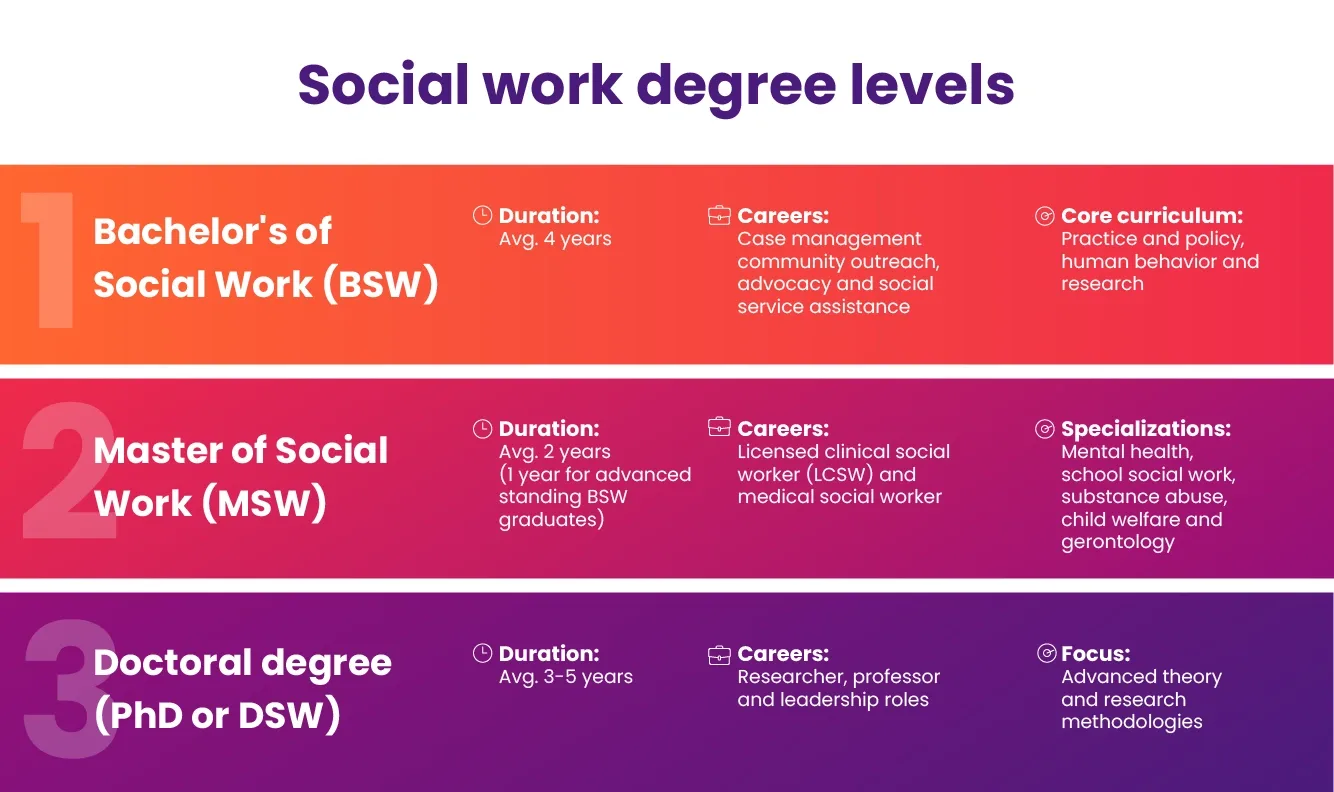Which social work degree is right for you?
We’ll help you navigate the process of becoming a social worker

What degree do you need?
Driven by compassion and a desire to empower others, social workers are crucial in supporting individuals, families, and communities who are facing challenges. From advocating for social justice to providing mental health counseling, this field offers diverse career paths, each with specific degree requirements. Let’s explore the most common degrees.
Bachelor’s degree in social work
The Bachelor of Social Work (BSW) is generally the entry-level degree for social worker positions. This four-year program equips you with a foundational understanding of social work theory, practice, and ethics.
- Social work practice
- Human behavior
- Social welfare policy
- Research
- Cultural competency
- Case management
- Community outreach
- Advocacy
- Social service assistance
Ensure your chosen program is accredited by the Council on Social Work Education (CSWE) to meet licensing requirements and ensure a quality education.

Master’s degree in social work (MSW)
The Master of Social Work (MSW) is standard for those seeking to become licensed clinical social workers. This advanced degree delves deeper into specialized areas of practice and research. If you already hold a BSW, you may be eligible for an accelerated MSW program, potentially reducing the time to graduation.
- MSW specializations:
- Mental Health
- School Social Work
- Substance Abuse
- Child Welfare
- Gerontology
While salaries vary based on location, specialization, and experience, an MSW typically commands a higher earning potential than a BSW.

Doctoral degrees in social work
If you're passionate about research, teaching, or leadership roles within social work, pursuing a doctoral degree (PhD or DSW) is the next step. These programs delve into advanced theory, research methodologies, and policy analysis.

Licensure and education requirements
Navigating the path to becoming a licensed social worker involves understanding the link between education and licensure requirements. Your education directly impacts the type of license you can obtain, which in turn dictates your scope of practice.
For instance, an MSW is typically required for clinical licensure (LCSW). Supervised fieldwork is another cornerstone of social work education and licensure. Because through fieldwork, you’ll gain invaluable hands-on experience and apply classroom learning to real-world scenarios under the guidance of seasoned professionals.

Choosing the right social work program
Consider these factors when selecting a program:
- CSWE accreditation and robust fieldwork opportunities: Essential for licensure and career advancement
- Specializations: Align your program with your career interests
Format: Explore traditional on-campus or online degree options to fit your lifestyle; online programs offer flexibility for working professionals or those with geographical limitations

Career paths and advancement opportunities
Your chosen degree matters. A BSW will open the door, while an MSW prepares you for clinical practice and leadership roles. Continuing education can further enhance your career prospects.
With a BSW, you can become a:
- Case manager: Connect individuals and families to needed resources and support services
- School social worker: Provide support and advocacy for students facing academic, social, or emotional challenges
With an MSW, you can become a:
- Licensed clinical social worker (LCSW): Provide therapy, diagnose conditions, and develop treatment
- Medical social worker: Assist patients and families navigating the healthcare system

What’s next?
Embarking on a social work career is a rewarding journey fueled by a passion for social justice and empowering others. By understanding the educational pathways and degree requirements for social workers, you can make informed decisions about your future.
Ready to take the next step? Connect with enrollment advisors from accredited social work programs to discuss your goals, explore program options, and receive personalized guidance on your path to becoming a social worker.